Biography
Luisa Valenzuela Levinson was born and raised in Buenos Aires, Argentina, on 26 November 1938, to Pablo Francisco Valenzuela, a physician, and to writer Luisa Mercedes Levinson.
At the family home, various writers gathered such as Adolfo Bioy Casares, Jorge Luis Borges, and Ernesto Sabato. Though she felt an interest in natural sciences from an early age, at 17 she began publishing in several newspapers, such as Atlántida, El Hogar and Esto Es, and worked for Radio Belgrano, as well.
At 20, just barely married to Theodore Marjak, a French merchant marine, she moved to Paris where she worked for Radio Télévision Française, and met members of both the nouveau roman literary movement and Tel Quel . She published her first fiction work entitled Clara (Hay que sonreír), whose main character would give its name to the title of the book of both English and French translations. In 1958, Luisa Valenzuela gave birth to her daughter, Anna-Lisa Marjak.
In 1961, she moved back to Argentina, where she worked as a journalist for La Nación and Crisis magazine. In 1965 she got divorced. During 1967 and 1968 she traveled throughout Bolivia, Peru and Brazil working for La Nación. [6]
In 1969, she obtained the Fulbright Scholarship to study at the University of Iowa where she wrote The Efficient Cat (El gato eficaz). Between 1972 and 1974 she lived in Mexico City, Paris and Barcelona, with a brief stay in New York, where she researched the expression of the marginal United States literature as a recipient of the scholarship awarded by Argentina's National Fund for the Arts (Fondo Nacional de las Artes). As a consequence of the National Reorganization Process, that partially censored her novel He Who Searches (Como en la guerra) by removing a torture scene, she moved to the United States where she lived for ten years. There she published in 1982 her short fiction book Change of Guard (Cambio de armas) and in 1983 The Lizard's Tail (Cola de lagartija), a novel about José López Rega, Minister of Social Welfare during Isabel Perón's presidency that was supposed to be originally titled as Red Ant Sorcerer, Lord of Tacurú and Her Sister Estrella (El Brujo Hormiga Roja, Señor del Tacurú y su Hermana Estrella). [7] [8]
Luisa Valenzuela was a Resident Writer at the Center for Interamerican Relations at New York and Columbia University, where she taught writing workshops and seminars for ten years. She was a member of the New York Institute for the Humanities, at the Fund for Free Expression and member of the Freedom to Write Committee of the PEN American Center. In 1983 she was awarded the Guggenheim Scholarship. In 1989 she returned to Buenos Aires, where she finished her fiction works National Reality from Bed (Realidad nacional desde la cama), conceived initially as a play but finished as a novel and Black novel with Argentines (Novela negra con argentinos) that originally was meant to bear the title of The Motive (El motivo). [9]

Angélica Gorodischer was an Argentine writer who was known for her short stories, which belong to a wide variety of genres, including science-fiction, fantasy, crime and stories with a feminist perspective.
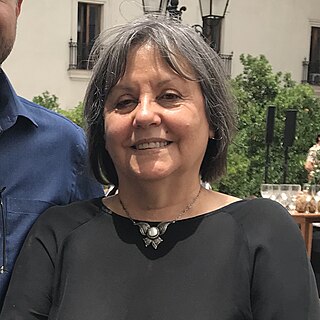
Diamela Eltit is a Chilean writer and university professor. She is a recipient of the National Prize for Literature.
Andrew Michael Graham-Yooll OBE was an Argentine journalist, the son of a Scottish father and an English mother. He was the author of about thirty books, written in English and Spanish. A State of Fear has become a classic on the years of terror in Argentina.

César Aira is an Argentinian writer and translator, and an exponent of contemporary Argentinian literature. Aira has published over a hundred short books of stories, novels and essays. In fact, at least since 1993, a hallmark of his work is a truly frenetic level of writing and publication—two to five novella-length books each year. He has lectured at the University of Buenos Aires, on Copi and Arthur Rimbaud, and at the University of Rosario on Constructivism and Stéphane Mallarmé, and has translated and edited books from France, England, Italy, Brazil, Spain, Mexico, and Venezuela.

María Dhialma Tiberti was an Argentine writer. Married to the well known scientist Gregorio Baro, she studied at the Escuela Normal Nº1 Mary O’Graham, and later on, literature and history, at the Universidad Nacional de La Plata. She was responsible for the Del Bosque editions, composed of works of other well-known writers, such as Raúl Amaral, Horacio Ponce de León, Ana Emilia Lahite, and María de Villarino, who were all part of the so-called Generation del 40.
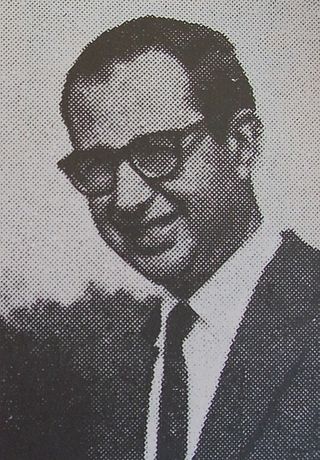
Noé Jitrik was an Argentine literary critic.
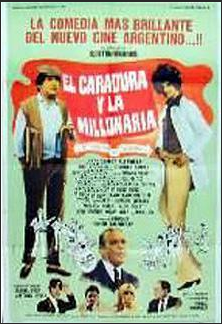
El Caradura y la millonaria, also known as No estoy enamorada de tí, pero te quiero. is a 1971 Argentine comedy film directed by Enrique Cahen Salaberry. It was one of several films by Cahen Salaberry after his return from Spain to Argentine cinema in the 1960s. The screenplay was written by Luis Cesar Amadori and Antonio Botta. It is a remake of the 1938 film El canillita y la dama. The film premiered on 6 March 1971, and starred Juan Carlos Altavista and María Vaner, with Vaner performing her own songs.

Arturo Carrera is an Argentine poet.

Beatriz Sarlo is an Argentine literary and cultural critic. She was also founding editor of the cultural journal Punto de Vista. She became an Order of Cultural Merit laureate in 2009.

Diana Bellessi is an Argentine poet.
Luisa Peluffo is an Argentine writer and journalist.
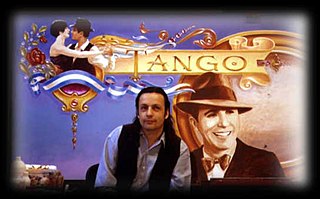
Jorge Muscia is a plastic artist and ‘fileteado’ instructor with over 30 years of experience in his field. Muscia, also known as the Fileteador of Tango, distinguishes himself for being a force in the revival of this old style of painting and for being a renowned instructor and promoter of the art of the filete in Argentina and the world.
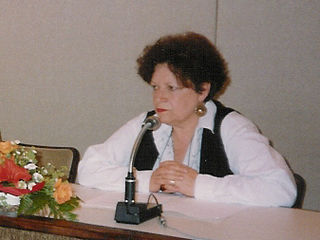
Luisa Futoransky is an Argentine writer, scholar and journalist living in France.
Professor Clara Passafari de Gutiérrez was an Argentine ethnologist, anthropologist, writer and poet.

Paulina Vinderman is an Argentine poet and translator.

Sabina Andrea Frederic is an Argentine social anthropologist, university professor and politician. A specialist on military and security personnel, she was Argentina's Minister of Security from 2019 to 2021, in the cabinet of President Alberto Fernández.
Mario David was an Argentine film director and screenwriter. He directed and wrote 12 films between 1971 and 1996.
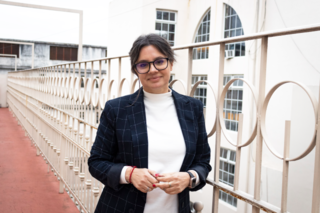
Gisela Marziotta is an Argentine journalist, writer and politician, who is currently a member of the Argentine Chamber of Deputies representing the Autonomous City of Buenos Aires since 2020 for the Frente de Todos coalition.
Lila Guerrero was a Jewish poet, translator, essayist, playwright and literary critic famous for translating numerous Russian and Soviet modern poetry into Spanish.
Stella Manuela Juliana Calloni Leguizamón is an Argentine journalist and writer specializing in international politics, whose investigative work focuses on Latin American military dictatorships and related political processes. Her books Los años del lobo: la Operación Cóndor (1999) and Operación Cóndor, pacto criminal (2006) gather parts of her research into the campaign known as Operation Condor.
This page is based on this
Wikipedia article Text is available under the
CC BY-SA 4.0 license; additional terms may apply.
Images, videos and audio are available under their respective licenses.














